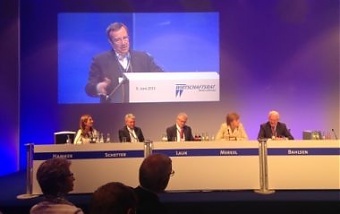Estonia, EU – Baltic States, Forum, Internet, Technology
International Internet Magazine. Baltic States news & analytics
Thursday, 18.04.2024, 03:50
Estonian president: without Germany, the EU will never reach the common digital market
 Print version
Print version |
|---|
| Photo: president.ee |
The Estonian Head of State was one of the keynote speakers – with the Federal Chancellor, Angela Merkel, the head of Google Eric Schmidt; and possible candidate for the office of president of the United States of America, Jeb Bush, at an annual conference organised by the Christian Democratic Union Party (CDU). This year, the meeting's slogan is "Go on instead of fearing the future: Reforms for Germany and Europe".
President Ilves spoke at the invitation of the organisers of the conference about boosting the competitiveness of the European Union and the creation of jobs in a digital society.
A common digital market would give Europe and our companies the essential capability to compete with companies outside Europe, emphasised the Estonian Head of State, who is also a co-leader for the next year World Bank report that will focus on the influence of the internet on economic development.
President Ilves invited Europe to embrace openness and the abolishment of restrictions on digital services – barriers to the free movement of data mean that the European Union member states will lag behind the other countries of the world. Digital services know no borders; the key to the success of European companies is the free movement of information both globally and within the European Union.
German Chancellor Angela Merkel's address at the CDU economic conference echoed the sentiments of President Ilves; she invited Germany to welcome innovations that will ensure progress for both the economy and the country in general during the rapidly developing digital era.
Chancellor Merkel stated that while successful countries often live by the principle of "Everything not forbidden is permitted", Germany often demonstrates the tendency to assume that everything not permitted is forbidden. Such a way of thinking is an obstacle in preventing us from embracing innovative changes in today's rapidly moving information society, she warned; therefore, we need the courage to think or act, instead of waiting for new regulations to be imposed, as this will help the economy to adjust more speedily.








 «The Baltic Course» Is Sold and Stays in Business!
«The Baltic Course» Is Sold and Stays in Business!

